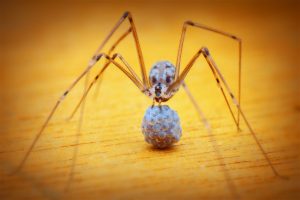& Pest Inspection Estimate! 800-332-BUGS (2847)
Why You’re Seeing More Spiders in Your Home

Spiders might just be one of the world’s most unloved creatures. Only entomologists like to find spiders in their homes. Unlike ants that boldly march around the kitchen or flies that buzz around our heads, most spiders are experts at hiding. So when spiders start making their presence known, it’s only natural to wonder why.
Here are some myths that the Burke Museum have debunked:
Myth #1: Spiders come into our homes in the fall for warmth.
Spiders are cold-blooded creatures with no need for warmth. In cold temperatures, they become dormant. As the Burke Museum puts it, “Most temperate zone spiders have enough ‘antifreeze’ in their bodies that they won’t freeze at any temperature down to -5°C.; some can get colder.”
Myth #2: Spiders come into our homes from the outside.
Some do. But about 95% of the spiders in our home have never been outdoors.
Male Spiders Are on the Move in Fall
Spiders are in our homes year-round lurking in dark, unused places like attics, basements, and even behind furniture. Like all living creatures, spiders have lifecycles. Maturing in spring, they mostly lay low in summer in an attempt to not be eaten. While female spiders will stay with their web, male spiders venture forth from their hiding places in the fall looking for partners with whom to mate.
Wet Summers Bring More Prey
In addition to the fall mating season, a wet summer will bring more insects into the house. Some outdoor spiders will follow their food into your house. House spiders will notice more prey in the house and become more active.
Don’t Invite Spiders Into Your Home
- The more stuff you store in your home, the more hiding places for spiders to live and reproduce.
- Seal door and window gaps. A small crack in a window or door or a tiny hole in a window screen is large enough for a spider to walk through.
- Clean regularly. Dusty and dirty spaces welcome bugs of all types. And, where there are bugs, hungry spiders will follow.
Spider Control From the Termite Lady
Ecola’s Termite Lady, Susan Fries, assures that they will be able to inspect your home for free, identify the spiders in your home, and recommend a course of action. For the list above, she likes to suggest that people either knock down or vacuum up webs on a regular basis. This will eliminate the number of spiders reproducing in your home. But when too many spiders are present, Ecola can offer eco-friendly pest control to help you sleep spider-free at night. Call Ecola at 800-471-BUGS (2847) to set up an appointment for your free inspection today.
